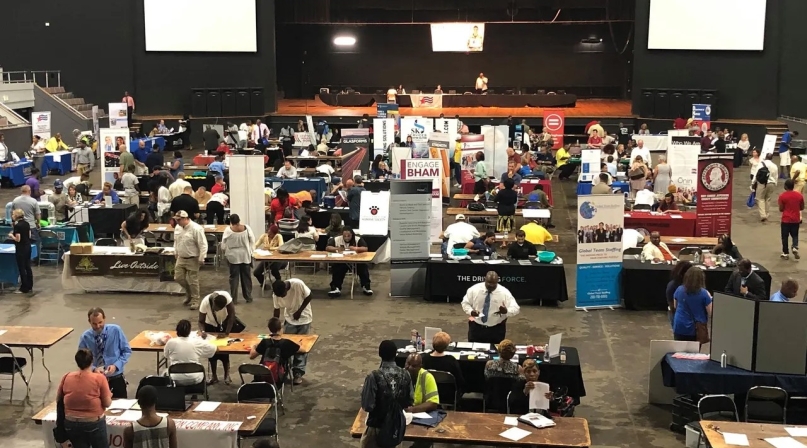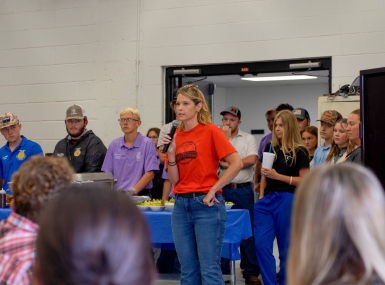Counties offer a second chance after incarceration

Key Takeaways
A job fair in Jefferson County, Ala. is connecting job seekers with local businesses to provide a second chance in the form of employment. The district attorney’s office collaborates with several local nonprofit organizations, businesses and government agencies to hold regular Second Chance Hiring Fairs for formerly incarcerated and justice-impacted individuals.
Annually, over 10 million individuals are released from jails and prisons. During reentry, individuals face tremendous barriers to success, including housing insecurity, inability to access health care and social services, financial strain, food insecurity and challenges to obtaining education and employment opportunities. Formerly incarcerated individuals often also must overcome social barriers like harmful stereotypes and stigma. NACo recognizes April as Second Chance Month. This month-long observation is a reflection on the importance of supporting individuals after time spent incarcerated.
Learn more
Charlotte Garnes, executive director and founder of ReNforce, a Georgia workforce development organization for justice-impacted individuals, defines successful reentry as mix of comprehensive rehabilitation, social integration and personal empowerment. To Garnes, success means more than just surviving, rather success is “holistic flourishment, opportunities for growth and being welcomed back into society without barriers and stigma.” Recognizing the worth and dignity of every individual prevents justice-impacted individuals from being reduced to their past mistakes.
Counties play a direct role in supporting individuals to overcome reentry barriers. Reentry is not a one-size-fits all endeavor, and counties offer a wide array of reentry services and support.
In Lane County, Ore. local agencies – Lane County Parole and Probation, the county’s public housing agency and the county’s leading community-based reentry service providers – have formed a partnership to provide affordable housing for individuals with criminal records. Through communication between these partners, innovative policy change occurred such as removing screening criteria related to criminal records not mandated by the U.S. Department of Housing and Urban Development.
Union County, Pa.’s Justice Bridge Housing Program provides participants monthly rental subsidies for up to 12 months or until they transition to the county’s federally funding Housing Choice Voucher program or obtain market-rate housing. Additionally, participants also receive support services while on probation or parole. Participants of the program are individuals who have a substance use disorder and are deemed high-risk for recidivism. The program’s recidivism rate is significantly lower than the county and state averages.
In Niagara County, N.Y., the jail initiated a program in partnership with the local community college to offer education courses. The course credits earned are transferable to other colleges upon release.
In Orange County, Calif. the county Health Care Agency uses federal funding to address the mental health and substance based needs of incarcerated individuals in their county jail. Prior to release, the county provides a reentry needs assessment and shares information regarding housing and treatment services. Upon release, individuals meet with peer navigators, who provide basic services – such as charged phones, bus passes and clothing – before initiating a warm handoff to the Community Support and Recovery Center. Among the services provided by the reentry hub include substance use disorder and mental health treatment.
Related News

SBA issues new rule affecting local permitting in post-disaster rebuilding
The U.S. Small Business Administration (SBA) has issued an interim final rule that changes how rebuilding projects financed with SBA disaster loans following a Presidentially declared disaster interact with state and local permitting requirements.

Chamber of commerce program helps keep workers on the job
Audrain County, Mo.'s Workforce Resource Assistance Program has helped employers keep staff in place, reducing turnover and promoting stability.
Resource
Second Chances, Safer Counties: Workforce Development and Reentry


